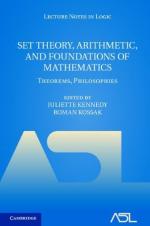|
This section contains 1,029 words (approx. 4 pages at 300 words per page) |

|
Set theory is concerned with understanding those properties of sets that are independent of the particular elements that make up the sets. Thus the axioms and theorems of set theory apply to all sets in general, whether they are composed of numbers or physical objects. The foundations of set theory were largely developed by the German mathematician George Cantor in the latter part of the nineteenth century. The generality of set theory leads to few direct practical applications. Instead, precisely because of its generality, portions of the theory are used in developing the algebra of groups, rings, and fields, as well as, in developing a logical basis for calculus, geometry, and topology. These branches of mathematics are all applied extensively in the fields of physics, chemistry, biology, and electrical and computer engineering.
Definitions
A set is a collection. As with any collection, a set is composed...
|
This section contains 1,029 words (approx. 4 pages at 300 words per page) |

|


